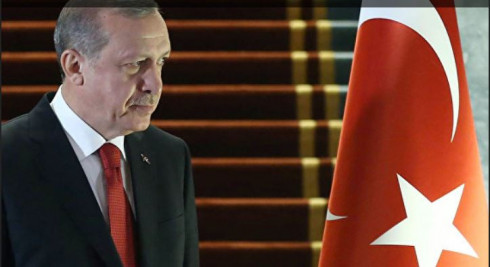Original published by 3mv.ru; translation by J.hawk
Turkey suffered several terrorist attacks in the last few days. If the home-made bomb explosion in Diyarbakir is most likely the responsibility of the PKK, the Ankara terrorist attack which caused tens of fatalities is a bit more ambiguous. Though Erdogan doesn’t think so. He said it was perpetrated by a Syrian Kurd by the name of Salih Nejar who in turn is backed by the leaders of Syrian Kurdistan. Prime Minister Davutoglu also added the Assad government to the list of guilty parties, with the Syrian Kurds being his accomplices. Once again accusations were leveled at Russia which helps Assad, the Kurds and even, according to Erdogan, the Islamic State. Moreover, in retaliation for a terrorist attack supposedly committed by Syrian Kurds, Turkey launched air attacks against Turkish Kurd positions in Iraqi Kurdistan. “70 terrorists were liquidated by our air force in the area of Haftanin in Northern Iraq, PKK members including its leaders,” Davutoglu said.
Naturally, the Turkish response will not be limited to airstrikes. Erdogan announced that 14 individuals were arrested and that the country ought to expect more arrests and possibly an invasion of Syrian Kurdistan. “Our losses have exhausted our patience…Turkey will not hesitate to use its lawful right to self defense whenever, wherever, and in any situation,” Erdogan said. He also took the US to task which have earlier refused to allow him to invade Syrian Kurdistan. “We spoke to our friends concerning the strong links between PKK, PYD, and YPG, but they didn’t believe us. I think that now there will be more understanding on their part,” Erdogan said.
Who needs it?
It may be Erdogan is mistaken. In spite of his statements, the US has not changed its position and are calling on both the Kurds and the Turks not to escalate the situation. “We are calling on Kurdish self-defense units not to undertake actions that would increase the level of tensions with Turkey. We also insist Turkey stop its artillery bombardments of Kurdish territory,” said State Department’s official spokesperson, Mark Toner.
It would appear that Washington does not believe Erdogan’s claims of YPG and PYD complicity in the terror attack in Ankara. And, indeed, the Turkish version of events has two serious flaws. First of all, Syria’s Kurds are least of all interested in launching terrorist attacks on Turkish territory which would only give Erdogan an excuse to invade Syrian Kurdistan. Therefore the statement of Kurdish self-defense leader Saleh Muslim that “not a single bullet has been fired by us toward Turkey” sounds entirely commonsensical. Even if the organizers included a Syrian Kurd, he had no authority to act from YPG or PYD and likely simply took revenge for the regular Turkish shelling of Kurdish units and for Ankara’s support of ISIS militants who exterminated Kurdish villages. Secondly, the speed with which the alleged terrorist was identified and alleged accomplices arrested also causes suspicion. It doesn’t necessarily mean Turkish secret services organized the terrorist attack themselves (that would be pure madness), but it could mean that there exists a radical Kurdish cell not subordinate to PYD.
There is also another possible scenario which, in spite of its “conspiracy theory” aspect, nevertheless needs to be aired out. It can’t be ruled out that Turkey has powerful forces which are not happy with the president and are pushing him toward an intervention. They would benefit no matter what hapens. If Turkish forces defeat Kurdish militias and avoid being hit by Russian missiles, Ankara will manage to inflict a severe blow to the “Kurdish cause” and PKK’s combat potential. If the Turkish invading forces are destroyed by Russian missiles or Syrian artillery supported by Russian airpower (which amounts to the same thing), Erdogan will be forced to retreat in defeat, which will create an opportunity to remove him from power.
Status-quo is better
On the one hand, one might think that Moscow would prefer a Turkish intervention. A failed Turkish intervention would solve a whole range of problems faced by Russian diplomacy. It will result in a Turkish government “reset” that would enable to establish normal relations with Turkey without demanding apologies for the Su-24 incident. Secondly, an attack on the Kurds who would then rely on Russian and not US protection would finally convince the Syrian Kurds to collaborate with Damascus and not the Americans.
On the other hand, however, it would be very dangerous to place one hopes in a Turkish intervention. First of all, there are no guarantees that the US won’t change its position and offer Ankara full support. There are also no guarantees that Moscow would immediately strike the Turkish expeditionary corps–and the situation is such that it would require an immediate strike, without negotiations and delays. Finally, a Turkish intervention would put an end to negotiations by giving militants hope that Turkish forces in Syria would be followed by some other friends.
Therefore it’s best for Moscow to preserve the current status-quo: Ankara threatens an invasion and shells Kurdish areas, Washington is hesitant to choose one of the two sides to the conflict whose support it needs, Kurds are growing angrier at the US and Turkey and begin to appreciate Russia’s role in supporting its offensive operations and protecting them against Turkish troops. “Any invasion of a sovereign country’s territory is unlawful. These are basic truths,” said Russian MFA representative Maria Zakharova. We expect that countries of the region will base their plans on respect for international law and norms, and not on what they want to do.”





Russians know, how to build caludrons. They demonstrated it several times in Donbas.
I am eager to see also Turks to trap into one of them.
I do believe, that Syrian army (in Donbas the local army of Novorossia played the same role) will take care of the Turks on the ground and Russian Kaliber missiles, Grads and Burationos will take care as a fire support.